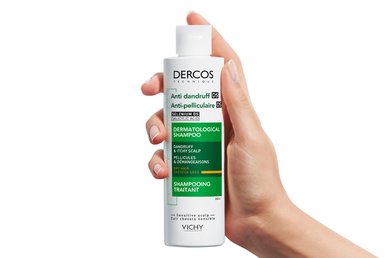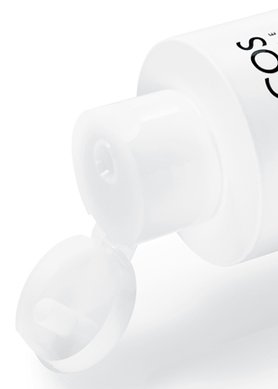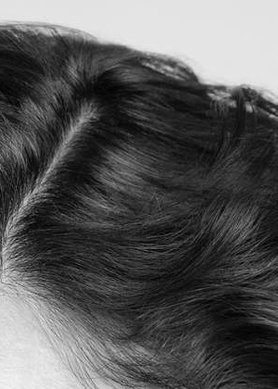
When we experience a recurring scalp concern like dandruff, it can be difficult to target without understanding the root cause. Emotional stress can physiologically manifest in various ways, and there is a long-studied connection between increased stress levels and dermatological skin concerns like dermatitis, eczema-prone skin, acne-prone skin, psoriasis, and excess hair fall.1 With this in mind, can stress cause dandruff? To get an answer to this question, we reached out to dandruff and hair care experts Dercos Australia to better understand the relationship between stress and dandruff.
Can dandruff be caused by stress?
The scalp is a delicate balance of microbiome that can be prone to disruption, but does stress cause dandruff? The short answer is no – stress alone does not cause dandruff. There are a few types of dandruff but this concern occurs when there are imbalances on the scalp caused by the presence of yeast. This yeast feeds on sebum (oil) and produces oleic acid. Since most scalps are sensitive to oleic acid, they will try to shed dead skin cells at a faster rate than normal.2 These dead skin cells eventually build up on the scalp and flake off. Though we can rule out if dandruff is caused by stress, it may still be a contributing factor.
How are stress and dandruff connected?
While stress does not directly cause dandruff, there could be a link between your stress and dandruff. So, how can stress impact your scalp?
Hormone imbalances: Stress can produce hormonal changes, and a hormone imbalance can lead to overactive sebaceous glands. We know that scalp yeast feeds on sebum, so the more oil your scalp produces, the more you produce oleic acid. Together, these elements trigger a faster shedding of dead skin cells – causing dandruff. Ultimately, stress isn’t a direct cause, but it can play a role in how dandruff forms because stress-related hormone imbalances can urge the scalp to generate more oil, which starts the cycle over.
Itching sensations and scratching: Itching sensations are often connected to anxiety, but stress can also worsen the feeling of itching sensations.3 While itching sensations are a byproduct of dandruff, when we scratch, this can damage the hair follicle or break the scalp skin – exacerbating existing dandruff and delaying the healing process.
How to manage stress and dandruff
Since stress has the ability to trigger or exacerbate skin concerns, it can feel like a never-ending cycle – and a difficult one to get out of. However, it’s important to remember that you’re not alone; half of the population experiences dandruff at some point in their lifetime4, so there are a wealth of products to combat dandruff and prevent dandruff from recurring. We recommend that you manage stress and dandruff with a two-pronged approach: building a targeted hair care routine and making a few lifestyle adjustments to reduce your stress. Read on for our expert tips.
Build an anti-dandruff hair care routine
The first change you can make to address dandruff and stress is to adjust your haircare routine to include products specifically formulated to get rid of dandruff flakes, minimise itching sensations and rebalance the scalp’s natural microbiome. Your choice of anti-dandruff shampoo should be dictated by your scalp and oil levels.
For normal to oily hair: Dercos Anti-Dandruff DS Shampoo For Normal To Oily Hair harnesses the dual power of selenium disulfide and salicylic acid to target the root cause of dandruff while clearing scalp buildup and regulating oil.
For dry hair: formulated with salicylic acid to remove flakes and selenium disulfide to target existing dandruff, Dercos Anti-Dandruff DS Shampoo For Dry Hair helps reduce dandruff without depriving the hair of necessary moisture.
For sensitive scalps: we recommend Dercos Anti-Dandruff Shampoo For Sensitive Scalp since it is infused with piroctone olamine to address dandruff, while bisabolol works on comforting the scalp.
Prioritise sleep and good nutrition
Sleep and diet play a major role in not just our overall health but our stress levels as well. In fact, a lack of sleep can cause a spike in your cortisol (the stress hormone) levels.5 And while a full night’s sleep might not always be achievable, experts suggest 7-9 hours is a healthy amount.6
A balanced diet rich in nutrients is going to support a healthy immune system – your body’s ability to heal itself. Vegetables and foods that are high in omega-3 (fish, nuts, seeds, etc.) have been known to help balance cortisol levels so make sure to incorporate a good mix into your diet.7 By taking an active approach to managing stress through sleep and diet, you may be able to minimise the effects of stress on dandruff.
Practice achievable daily movement
When we get stressed, the body produces a flood of cortisol which may trigger excess oil on the scalp. However, exercise can reduce your stress levels8 – which may help rebalance your hormone levels. This can be anywhere from moderate to more intense movements, whether that’s as gentle as walking the dog or as exertive as a spin class. The key is to just get the body moving each day in a way that feels achievable.
1https://www.ncbi.nlm.nih.gov/pmc/articles/PMC4082169/
2https://pubmed.ncbi.nlm.nih.gov/20650257/
3https://www.ncbi.nlm.nih.gov/pmc/articles/PMC5845794/
4https://www.betterhealth.vic.gov.au/health/conditionsandtreatments/dandruff-and-itching-scalp
5https://pubmed.ncbi.nlm.nih.gov/9415946/
6https://www.nhlbi.nih.gov/health/sleep/how-much-sleep
7https://nutritionsource.hsph.harvard.edu/stress-and-health/
8https://www.health.harvard.edu/staying-healthy/exercising-to-relax






